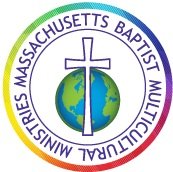TPMP
Thriving Pastoral Ministry Program
The Thriving Pastoral Ministry Program works towards realizing the Massachusetts Baptist Multicultural Ministries (MBMM) vision of “Weaving God’s Love Across Cultures” and fulfilling our mission of ACE: Advocacy, Celebration & Empowerment of immigrants. Ethnic Clergy Groups and Intercultural Groups provide minority pastors a “seat at the table” and access to a different network of ministers than they have routinely encountered. These groups will create spaces and structures for multicultural approaches to ministry to be shared and honored which will offer unique opportunities for ministerial evolution.
To be faithful to God’s celebrating the great diversity of our world we need to prepare pastoral leadership that is astute, gifted, in possession of a clear sense of calling, and wise in ministering to that rich diversity. Never has there been a time when celebrating, understanding, and creating bridges across differences have been more important.
Marks of thriving pastoral leaders include a clear vision of their ministry, collegial support, and opportunities for spiritual, professional, and personal development. A thriving pastoral leader is one whose ministry brings the minister great joy in the midst of challenges and has enough of the appropriate resources to give the minister the support that is needed.
MBMM administered a survey and conducted listening sessions with 60 pastors to find out what their needs were and ways to support them so that they might thrive in ministry. The immediate needs expressed were for more collegial groups with clear goals and resources, collaborative coaching and mentoring, therapy/coaching for clergy couples, workshops, bold conversation on difficult topics, training in cultural competency, conflict management, immigration, administrative and budget management, and lay leadership development.
The current state of the pastoral ministry is not sustainable because of the stress; demands and needs which go unmet due to a lack of resources; and insufficient opportunities for collegial support, professional growth, and personal well-being. Major challenges for clergy include:
Bi-vocational pastors’ roles often exceed a part-time schedule, yet churches do not have the financial capability to pay pastors full-time salaries. This leads pastors to take employment above and beyond the church ministry, causing clergy burnout, stress, and poor work, family, and personal life balance.
Lack of financial resources further causes financial strains, stress, and anxiety for pastors who need financial support to fulfill their ministry.
Limited professional development cease to exist as pastors war with unmet attempts to gain financial access to training and growth opportunities that will edify and cultivate their success in ministry.
Limited collaborative opportunities
Ethnic, cultural, and theological silos resulting in cultural isolation exist in pastoral ministry as diverse views, voices, and perspectives become more limited, inaccessible, and less formulated in ministerial settings.
Insufficient collegiality, and personal isolation of pastors is a major concern for clergy as they feel profound isolation and the absence of deeper friendships amongst peers and colleagues.
Pastors express difficulties in balancing work, ministry, family, and personal time and care as they operate in their respective ministries.
Affirming and celebrating women in ministry
Navigating American institutional and racial inequality
MBMM has created the Thriving Pastoral Ministry Program that works to nurture the collegial relationships, professional development, and personal and spiritual development of clergy.
Intercultural Groups (ICGs) meet monthly to address the impact of cultural and theological silos and cultural isolation, model constructive conversations across differences, and establish the structure and covenant for a beloved community that models respect and dignity for each person. Ethnic Clergy Groups (ECG) meet monthly to enhance communication and trust, strengthen shared cultural heritage and identity, and exchange best practices in ministry that are culturally relevant.
Why choose us?
MBMM conducted listening sessions with 60 pastors to find out their needs and ways to support them so they might thrive in ministry. The immediate needs expressed were:
For more collegial groups with clear goals and resources
Collaborative coaching and mentoring
Therapy/coaching for clergy couples
Workshops
Bold conversation on difficult topics
Training in cultural competency
Immigration, administrative, and budget management
Clergy continuing education support
Individual clergy, clergy and spouse retreats
Help gather resources and best practices to share with other pastors



